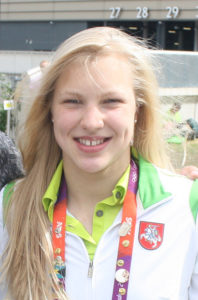Rio Olympics 2016 was one of the biggest events this summer that captured the world’s attention. What we saw is a competition between countries that win more medals, but inside every sport and country has a different story. One such story is about a young Lithuanian swimmer, Ruta Meilutyte, who won all possible champions in the world, but at the end of the Rio Olympics surprisingly returned to Lithuania without a single medal.
Becoming a star
by: nrcphotos [CC BY 2.0], via Wikimedia Commons
What happens in Rio, stays in Rio
Ruta went to Rio as a London Olympics, World and European champions’ medals winner. Moreover, she had also achieved many swimming records – 8 European records and 3 World records. Expectations before her swims in Rio were high, in some ways too high. She swam in the finals with the best 8 swimmers. She did not win any medal – she came 7th in the women’s 100-metre breaststroke swimming ranking.
The current situation
The post Rio reaction involved lots of criticism and negative emotions – everyone was expecting Ruta to win a medal, and not just any medal, but a gold. Despite the fact that after her swim Ruta was full of anger, despair and tears of resentment, she was interviewed by a Lithuanian journalist who asked questions such as ‘’What was the most difficult for you today?’’, ‘’How do you evaluate your swimming time?’’, ‘’Is this the biggest disappointment of your life?’’. Former Lithuanian swimmer Arvydas Juozaitis, whose best result was bronze in the Montreal Olympics 1976, said during an interview that the peak of Ruta’s career is over as she has not improved since London Olympics 2012.
by: Chan-Fan (Own work) [CC BY-SA 4.0], via Wikimedia Commons
It is doubtful that he had ever said such a thing about a male swimmer. Ruta, after all, is only nineteen years and still has all her life, and probably most of her career, before her – think about the 50 metre freestyle Bronze Medal winner Aliaksandra Herasimenia who is nearly 31 years old. Of course, Ruta Meilutyte could become a mum; yes, she could get an academic qualification – but aren’t Juozaitis’ comments emblematic for a society which still sees female successes as a threat and rather would like reduce them to their stereotypical role as wives and mothers? In this situation – why should we not wish for Ruta to become stronger and faster and win a gold medal at the Olympics 2020 in Tokyo?


![By Chan-Fan (Own work) [CC BY-SA 4.0 (http://creativecommons.org/licenses/by-sa/4.0)], via Wikimedia Commons](https://www.youngfeminist.eu/wp-content/uploads/2016/09/Kazan_2015_-_R%C5%ABta_Meilutyt%C4%97_semifinal_100m_breaststroke_2-300x225.jpg)
![Women’s Participation in Hungarian Trade Unions – Nök a szakszervezetben?! [EN/HU]](https://www.youngfeminist.eu/wp-content/uploads/2016/05/148ucw-6-13-41-29-150x150.jpg)
![When is rape recognized as rape? The case of Germany – Wann ist eine Vergewaltigung eine Vergewaltigung? Der Fall Deutschland [EN/DE]](https://www.youngfeminist.eu/wp-content/uploads/2015/11/il_fullxfull.971261048_pxwu_grande-150x150.jpg)

Average Rating